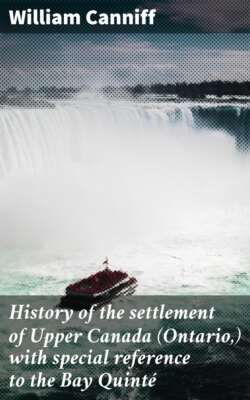Читать книгу History of the settlement of Upper Canada (Ontario,) with special reference to the Bay Quinté - William Canniff - Страница 32
На сайте Литреса книга снята с продажи.
CHAPTER VII.
ОглавлениеTable of Contents
Contents—A spirit of strife—The French war—British American Troops—Former comrades opposed—Number of U. E. Loyalists in the field—General Burgoyne—Defeat—First reverse of British arms—The campaign—Colonel St. Leger—Fort Stanwix—Colonel Baume—Battle of Bennington—General Herkimer—Gates—Schuyler—Braemar Heights—Saratoga—Surrender—The result upon the people—Sir John Johnson—Sir William—Sketch—Indian Chief—Laced coat—Indian’s dream—It comes to pass—Sir William dreams—It also comes to pass—Too hard a dream—Sir John—Attempt to arrest—Escape—Starving—Royal Greens—Johnson’s losses—Living in Canada—Death—Principal Corps of Royalists—King’s Rangers—Queen’s Rangers—Major Rogers—Simcoe—The Rangers in Upper Canada—Disbanded—The Hessians.
The seven years’ war between Canada and New England, in which a large number of the Colonists were engaged, had created not a few officers of military worth and talent, while a spirit of strife and contention had been engendered among the people generally. The Colonial war, carried on with so much determination, was stimulated, not so much by the English nation at home as by New Englanders. It was they who were chiefly interested in the overthrow of French power in Canada. While money and men had been freely granted by the Imperial Government, the several colonies had also freely contributed. They “furnished in that war quite twenty-eight thousand men, in more than one of the campaigns, and every year to the extent of their ability.” “On the ocean, full twelve thousand seamen were enlisted in the Royal Navy and in the Colonial Privateers.” In this manner had been formed a taste for military life, which waited to be gratified, or sought for food. When, therefore, the unsavory acts of England wounded the Colonial vanity, and demagogues traversed the country to embitter the feelings of the mass against the king, the hot-headed were not slow to advise an appeal to arms. At the same time, the loyal in heart, the conservators of Imperial interest, viewing with wonder and alarm the manifestation of fratricidal war—of rebellion, felt it their duty to take up arms against the unprincipled (and often dishonest) agitators, and endeavor to crush out the spirit of revolt. And thus it came, that very many who had fought side by side at Ticonderoga, Crown Point, Duquesne, Niagara, Oswego, Frontenac, Montreal, and around Quebec, under a common flag, were now to be arrayed in hostile bands. Not state against state, nor yet merely neighbor against neighbor, but brother against brother, and father against son! Civil war, of all wars, is the most terrible: in addition to the horrors of the battle-field, there is an upheaving of the very foundation of society. All the feelings of brotherhood, of Christian love, are paralyzed, and the demon of destruction and cruelty is successfully invoked.
Behold, then, the British Americans divided into two parties; each buckling on the armor to protect from the other, and sharpening the weapons of warfare to encounter his kindred foe. The contest of 1776-’83 is most generally looked upon as one between the English and Americans; but in reality it was, at first—so far as fighting went—between the conservative and rebel Americans. In an address to the king, presented by the loyalists in 1779, it is stated that the number of native Americans in his service exceeded those enlisted by Congress. Another address, in 1782, says that “there are more men in his Majesty’s provincial regiments than there is in the continental service.” Sabine says that “there were 25,000, at the lowest computation.” If such be the case, the question may well be asked, how came it that the rebels succeeded? Looking at the matter from our distant stand-point, through the light of events we find recorded, there seems but one conclusion at which we may arrive, namely, that the disaster to the British arms was due—altogether due—to the incapacity of certain of the generals to whom was intrusted the Imperial interests in America.
